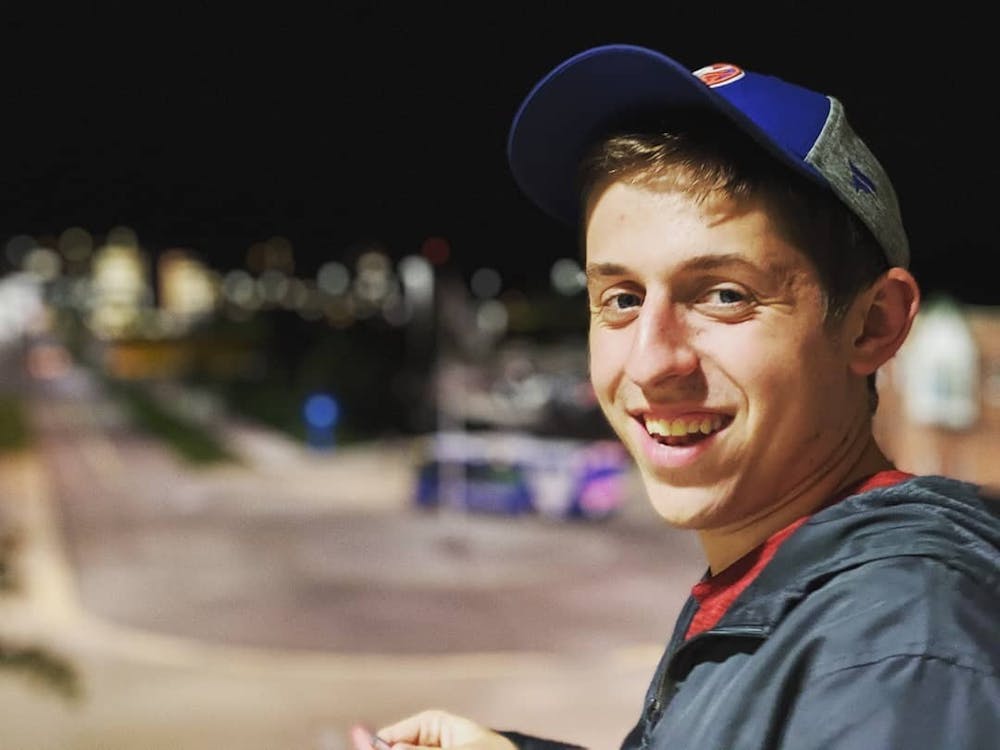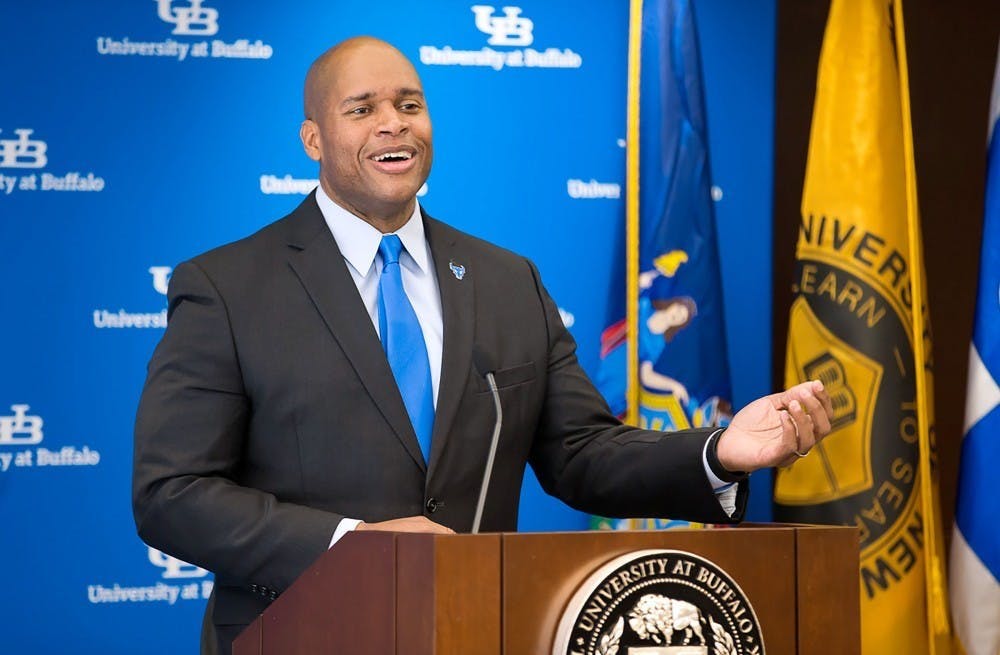Athletic Director Mark Alnutt has led his program to new heights.
And now, he’s tasked with guiding it through COVID-19 and the various financial, logistical and communicative hurdles that come along with it.
Alnutt has done a little bit of everything these past two weeks, from budgeting for the upcoming fiscal year to dealing with the implications of the NCAA canceling spring sports and reducing its revenue distribution.
In a phone interview with The Spectrum on Monday, he discussed everything from the MAC’s decision to cancel its postseason basketball tournaments to the potential for cuts to UB Athletics’ budget.
Our conversation, lightly edited for style and length, follows below.
The Spectrum: What have these past two weeks been like for you?
Alnutt: It’s been surreal. Obviously from a life standpoint, adhering to the guidelines that are out there. In my role as the athletic director at UB, making sure that our staff, our coaches and our student-athletes are healthy and safe. Being able to constantly convey and communicate updates from our staff to our student-athletes, that’s the priority. Things have changed drastically. So many of us are working remotely using Zoom and Webex. You always have to prioritize your family, in terms of their health and everything else. Obviously it’s been a whirlwind of activity, and there are still a lot of unknowns out there … We have to try our best to forecast in terms of what our operations might look like and could that be an impact in the fall, as we move forward.
TS: How long were you discussing the possibility of canceling the MAC tournament for? When was it clear that the decision needed to be made?
A: We were having discussions with athletic directors and the conference office. We were determining whether to continue the [men's and women's basketball] tournaments. We made a decision to cancel the tournaments based on everything that was occurring at that time, and then also as we moved forward, we had heard that other conferences were either suspending or canceling their spring season. We wanted to see what the NCAA was going to do, and that Thursday, when it came out that they decided to cancel the remainder of their winter championships along with their spring championships, it made our decision easier to go ahead and cancel the spring season. Obviously you can’t forecast ahead to where we are now, but in retrospect, it was the right decision. Tough decision to make. It tugs at your heart, understanding the work and the preparation that our kids and coaches put in, but at the end of the day it was the right decision when you look back on it.
TS: What guidance has UB Athletics given the affected student-athletes? How have they responded to the situation?
A: Communication is very important, especially for the student-athlete population. They are so used to structure in their lives, as it pertains to going to class, practice, strength and conditioning, study hall and competitions. Our message to our coaches is to stay in close contact with them during this time, because that structure in their life is missing … And most importantly, trying to provide empathy, understanding the disappointment that some of these athletes did not have the opportunity to compete. But hopefully that’s something they can look back on in five, ten years and be able to reflect that it was for the good of the cause.
TS: What is the financial impact of canceling sports on UB Athletics? How do reductions in NCAA distributions and student fees affect the department?
A: The biggest consequence is canceling the NCAA tournament, in which the majority of those monies are distributed back to the membership. That has essentially been reduced to about 35% of what we had expected. With this pandemic, we are looking to see how it affects the budgets, especially the state budgets. As we try to forecast the future, what does that look like in terms of what type of assistance universities have? Not just athletic departments, but universities in general. Obviously if there are reductions in universities, there is going to be a reduction from an athletics standpoint. As we look at this fiscal year, we budgeted conservatively, when it came to ticket revenues and sources like that. We feel like we’ll be OK this fiscal year, without hopefully not having to get in our reserves. But the unknown is next year.
TS: Have you considered making cuts to address this financial uncertainty?
A: Not at this time. What we’re trying to do is forecast what 2021 looks like as it pertains to where we’re currently at with this pandemic. If we’re not able to go out and recruit this spring, if we’re not able to conduct camps, what does it look like from an enrollment standpoint? We’re trying to gather as much data as we can to make sensible decisions. Right now from a spending standpoint, we want to make sure our spending is essential spending. We want to be able to close out this fiscal year without us being in the red. As you move forward toward next year, the unknowns come from the health of the university, as it pertains to enrollment, as it pertains to the state subsidies to the university. We’re possibly budgeting to where we might be able to have all of our competitions next year, including football. But we’re cautious, because we don’t know the scope of the cuts from the state to the university, or how this might have an impact on enrollment in higher education.
TS: How have conversations been with coaches and UB Athletics employees when there is so much uncertainty right now?
A: Communication has been at a high level. I’m regularly communicating with our athletic department staff and our coaches through Zoom … We still have to recruit prospective student-athletes, try to find ways to be creative during this NCAA-mandated “dead period” that’s out there. But I think it’s important to continue to offer my appreciation to them for the job they’re doing during these uncertain times.
TS: What preparations are you making for 2021, being that there is so much uncertainty?
A: You just have to forecast various scenarios. It’s business as usual with no cuts, no drastic cuts from the state, no reduction in enrollments, what does that look like. Again, that’s our normal operating model. But now we’re trying to factor in, ‘Okay, what if the NCAA distribution stays at 35%? What if enrollment drops 20%? What if the state reduces subsidies by 20%?’ What do these look like, and how do we operate? Right now, we are just throwing things against the wall, but we’re hopeful that by the end of May, we can be able to put forth our budget understanding the limitations that might be out there. Are there certain things on the table we might need to discuss from a membership standpoint within the NCAA — amount of grant aid, amount of sports sponsorships, what have you? I think every discussion right now is on the table, and unfortunately, I don’t think we’re going to have a clear answer until we have a clear idea of how long this pandemic will last and how long the economy will take to recover.
Justin Weiss is the senior sports editor and can be reached at justin.weiss@ubspectrum.com

Justin Weiss is The Spectrum's managing editor. In his free time, he can be found hiking, playing baseball or throwing things at his TV when his sports teams aren't winning. His words have appeared in Elite Sports New York and the Long Island Herald. He can be found on Twitter @Jwmlb1.





